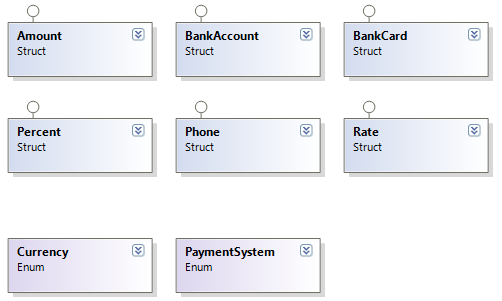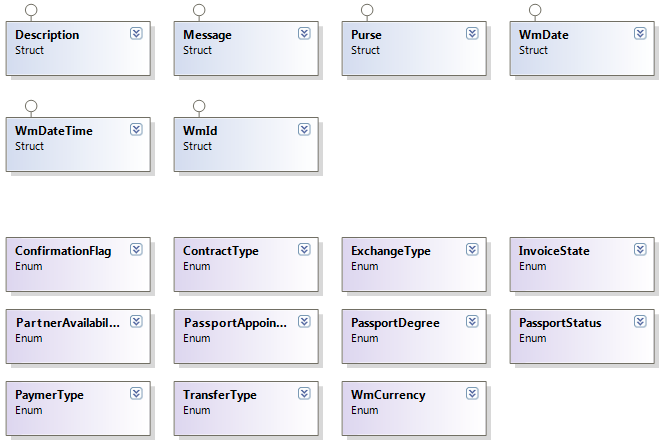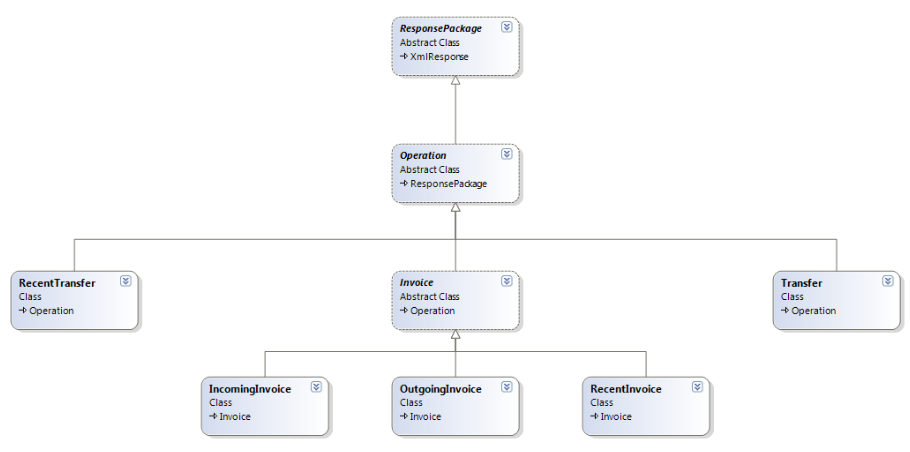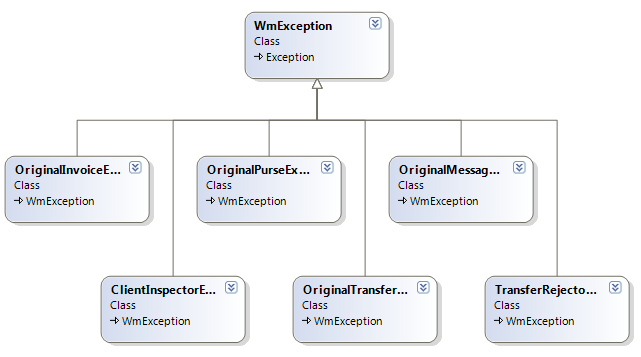| Permalink: |
WM-API
A library for using WebMoney XML interfaces on the .NET platform (WM-API)¶
This article is intended for developers who want to use WebMoney Transfer interfaces in Microsoft .NET applications.
The purpose of this article: provide brief information about the WebMoney.XmlInterfaces library (code name _WM-
API_) sufficient for using the library in your own projects.
The WebMoney.XmlInterfaces library was created for simplifying the work with the XML-interfaces of the
WMTransfer system. Written in managed C# it is distributed with open source codes and an "MIT" license:
http://www.opensource.org/licenses/mit-license.php. The program also uses a digital signature generation module
called WMSignerFX.
The latest 1.0 version of the library was released on December 16 2010.
Basic information about the library structure¶
Contents
- List of modules.
- Special types.
- Request and response classes.
- Special types for business process exceptions.
- Library initialization in the program code.
- Library initialization using a configuration file.
- General library usage scenario.
- Exception logging process.
- Usage examples.
1 List of modules
| Name | Purpose |
| BusinessTools.Cryptography.dll, WebMoney.Cryptography.dll | Generation of a digital signature. See WMSignerFX. |
| BusinessTools.Logging.dll, log4net.dll, NLog.dll | Logging of exceptions. |
| CertificateValidator.dll | Server certificate validation(used if the publisher's certificate has not been added to the root storage). |
| Finance.Entities.dll, WebMoney.BasicObjects.dll | Special types. |
| WebMoney.XmlInterfaces.Configuration.dll | Used for initializing the library with parameters set in the configuration file. |
| WebMoney.XmlInterfaces.dll | Types of requests/responses. Special types for exceptional situations. |
| XmlInterfaces.General.dll | Kernel. Base classes for server requests/responses. |
Detailed information about each of the modules is provided below.
2 Special types
The library uses special types for representing the main system entities.
The most general types are defined in the Finance.Entities library (not directly related to the WebMoney system).
| Type name | Meaning | Comment |
| Amount | Amount | Can be implicitly converted into a decimal value. The decimal type can be explicitly converted into an Amount value (preserving 2 digits after the period). |
| BankAccount | Bank account | Can contain digits only. |
| BankCard | Payment card | Can contain digits only. No additional checks are performed in version 1.0. |
| Currency | Payment currency | Can assume the following values in version 1.0: USD, EUR, RUR, UAH. |
| PaymentSystem | Payment system | For use with the X19 interface. Can assume the following values in version 1.0: PayPal, MoneyBookers, Yoomoney. |
| Percent | Percent value | Used for wm.exhanger.ru interfaces |
| Phone | Phone number | For use with the X19 interface. The phone number can be saved in 2 formats: +000000000000 and 000000000000. |
| Rate | Exchange rate | Can be implicitly converted into a decimal value. The decimal type can be explicitly converted into an Amount value. When the value is converted into a string, 4 digits after the period are preserved. |
These types can be serialized/deserialized. Below is a class diagram for these data types:

Types related to WebMoney only are defined in the WebMoney.BasicObjects library.
| Type name | Meaning | Comment |
| ConfirmationFlag | Confirmation | Used with the interfaceX2 |
| ContractType | Contract type | The type of contract in the Arbitrage service (for the interfaceX17). Can assume the following values: Public (for an agreement), Private (for a contract). |
| Description | A short string (up to 256 characters) | Can be implicitly converted into a System.String value. The System.String type can be explicitly converted into an Info type value (preserving the initial 255 characters). Use: comments to operations, delivery address, protection code. |
| ExchangeType | Exchange type | For use with the X19 interface. |
| InvoiceState | Invoice status | Enumeration can assume the following values: NotPaid (not paid), PaidProtection (paid with protection), Paid (paid without protection), Refusal (rejected). |
| Message | Long string (up to 1024 characters) | For use with the interface X6. |
| PartnerAvailability | Payment permissions | For use with the interface X8. Can assume the following values: InvoiceForbidden, MessageForbidden, TransferForbidden (several ). |
| PassportAppointment | Title | For the interface X11. Assumes one of the following values: PrivatePerson, Director, Accountant, Representative, PrivateEntrepreneur |
| PassportDegree | Passport level | For the interface X11. Assumes one of the following values: Alias, Formal, Initial, Personal, Merchant, Capitaller, Developer, Registrar, Guarantor, Service1, Service2, Operator |
| PassportStatus | Status | For the interface X11. Assumes one of the following values: PrivatePerson (individual), Entity (company). |
| PaymerType | Check type | For the interface X18. Can assume one of the following values: Paymer, WMnote, Check. |
| Purse | Purse | Data structure, consists of a PurseType value (the type of purse: Z, E, G, D, C, X, K, L, H,F,T) and a ulong value (purse number). |
| TransferType | Transfer type | Can assume the following values: Normal (regular), Protection (with payment protection), ProtectionCancel (with payment protection, cancelled). |
| WmCurrency | Type of WM currency | I version 1.0, the following currencies are defined: Z, E, G, D, C, X, K, L, H,F,T |
| WmDate | Date | Can be implicitly converted into a System.DateTime value. The System.DateTime type can be explicitly converted into WMDate (losing the time value). The time zone is taken into account during conversion. |
| WmDateTime | Date and time | Can be fully converted into a System.DateTime value. The time zone is taken into account during conversion. |
| WmId | WebMoney identifier | Can be implicitly converted into a ulong value. The ulong type can be explicitly converted into a WmId value (max value: 999999999999). |
These types can be serialized/deserialized. Below is a class diagram for these types:

3 Requests and responses
For each interface request and response, there exists a special type that icapsulates the data of a corresponding
request/response:
| # | Interface function | Request class | Response class |
| X1 | Invoice generation | OriginalInvoice | RecentInvoice |
| X2 | Funds transfer | OriginalTransfer | RecentTransfer |
| X3 | History of operations | TransferFilter | TransferRegister |
| X4 | List of generated invoices | OutgoingInvoiceFilter | OutgoingInvoiceRegister |
| X5 | Completion of operations with protection | ProtectionFinisher | ProtectionReport |
| X6 | Messaging | OriginalMessage | RecentMessage |
| X7 | Signature validation | SignatureInspector | SignatureInference |
| X8 | Search by purse or identifier | WmIdFinder | WmIdReport |
| X9 | Purse balance | PurseInfoFilter | PurseInfoRegister |
| X10 | Incoming invoices | IncomingInvoiceFilter | IncomingInvoiceRegister |
| X11 | Password information | PassportFinder | Passport |
| X13 | Rejection of protected payments | ProtectionRejector | ProtectionReport |
| X14 | Funds transfer rejection | TransferRejector | MoneybackReport |
| X15.1 | My trusts | OutgoingTrustFilter | TrustRegister |
| X15.2 | Incoming trusts | IncomingTrustFilter | TrustRegister |
| X15.3 | Trust creation or modification | OriginalTrust | TrustRegister |
| X16 | Purse creation | OriginalPurse | RecentPurse |
| X17.1 | Contract creation | OriginalContract | RecentContract |
| X17.2 | Information about acceptors | AcceptorFilter | AcceptorRegister |
| X18 | Merchant operation details | MerchantOperationFilter | ExistentMerchantOperation |
| X19 | Client inspector | ClientInspector | ClientEvidence |
Types of responses for incoming/outgoing invoices and transfers are inherited from the Operation base class. For
convenience see the class diagram below:

4 Special types of exceptions
The system has special types for all exceptions of the business process generated by the WebMoney server. In the
most general case an exception of the WmException type is thrown (the error number is saved in the error number
ErrorNumber property). This type is extended for some interfaces.
| Type of exception | Interface number |
| WmException | The base type for all business exceptions. Used for all interfaces besides the ones listed in the table. |
| ClientInspectorException | X19. Client validation |
| OriginalInvoiceException | X1. Invoice generation |
| OriginalMessageException | X6. Sending a message |
| OriginalPurseException | X16. Creation of a purse |
| OriginalTransferException | X2. Funds transfer |
| TransferRejectorException | X14. No-commission payment rejection |
You can identify an error by its number using the TranslateDescription method.
Types of exceptions can be serialized/deserialized. Below is a class diagram for these types:

5 Library initialization in the code
You need to initialize a library before using it. This can be done in two ways: (1) directly in the program code,
(2) in the configuration file.
An example of program configuration from the code using a Keeper WinPro key:
var masterWmId = (WmId) 111111111111; // alternatively, you can write WmId.Parse("111111111111")
KeeperKey keeperKey = new KeeperKey("Enter the XML key you got from the .kwm file using the Key Extractor tool");
var initializer = new Initializer(masterWmId, keeperKey);
initializer.Apply();
The primaryWmId variable here is an object of a WmId type keeping a identifier of the owner of the private
key. The keeperKey variable contains an object of the KeeperKey type from the WebMoney.Cryptography.dll library
(see. WMSignerFX).
An example of program configuration from the code using a Keeper WebPro key:
var initializer = new Initializer(certificate); initializer.Apply();
A certificate here is an object of the standard .NET X509Certificate class.
Once the parameters have been set you need to call the Apply method. The configuration will be applied globally
(this can be done just once before the interfaces are called). In some cases it may result in some problems (for
instance if a clustered architecture is being used) but you can avoid using global static objects. To do that
pass the local object of the Initializer class to the type-response constructor.
6 Library initialization in the configuration file
The second way to initialize the library is to set the parameters in the configuration file.
To perform authentication using a WM Keeper WinPro key you need to specify the following:
- The main WMID.
- A string representation of a WM Keeper key obtained with the help of Key Extractor.
- The necessary data for a request number generation: reference date and update time in milliseconds.
To perform authentication using a WM Keeper WebPro key you will need to specify the following:
- Location of the X.509 WM Keeper WebPro key: storage name and type. Alternative option: specify the Base-64 representation of the certificate and private key obtained with the help of Key Extractor.
- A thumbprint of the WM Keeper WebPro private key certificate. If a Base-64 certificate and private key representation are specified you do not need to specify a certificate thumbprint.
- The data for generating a request number: reference date and refresh period in milliseconds.
Note: if the library is used with a WM Keeper WebPro key the code must have FullTrust privileges.
An example of a configuration file for authentication based on a WM Keeper WinPro key:
<?xml version="1.0" encoding="utf-8" ?>
<configuration>
<configSections>
<sectionGroup name="webMoneyConfiguration">
<section name="applicationInterfaces" type="WebMoney.XmlInterfaces.Configuration.ConfigurationHandler,WebMoney.XmlInterfaces.Configuration" />
</sectionGroup>
</configSections>
<webMoneyConfiguration>
<applicationInterfaces>
<authorizationMode>Classic</authorizationMode>
<keeperClassic>
<wmId>712300479010</wmId>
<wmKey><RSAKeyValue><Modulus>ccqACxc2qzE3t+zJntCBGrw/qZTmrmJEPhmkVGUwhc+ZhDiIr4qwAvhnNwIme9r5YjWEdi7wm/XDnsp096aNjlkI<Modulus><D>FW1RaQMqZ6zHl6+wx+16uDB4zAmRr9sbBP7xVxzIg4vuIG4/w5b5XzFNv2sfSsmu+I3roO7E7qYmoeIn8otCeHgD</D></RSAKeyValue></wmKey>
</keeperClassic>
<requestNumber>
<startTime>01.01.2009 00:00:00</startTime>
<period>1000</period>
</requestNumber>
</applicationInterfaces>
</webMoneyConfiguration>
</configuration>
The wmKey parameter here is the value of a private key in the XML format obtained using
Key Extractor. Attention! XML-Encoding was applied to the key value ('<' and '>' symbols were replaced).
An example of a configuration file for authentication using a WM Keeper WebPro key where storage is specified:
<?xml version="1.0" encoding="utf-8" ?>
<configuration>
<configSections>
<sectionGroup name="webMoneyConfiguration">
<section name="applicationInterfaces" type="WebMoney.XmlInterfaces.Configuration.ConfigurationHandler,
WebMoney.XmlInterfaces.Configuration" />
</sectionGroup>
</configSections>
<webMoneyConfiguration>
<applicationInterfaces>
<authorizationMode>Light</authorizationMode>
<keeperLight>
<containerInfo>
<storeName>My</storeName>
<storeLocation>CurrentUser</storeLocation>
<thumbprint>65d4308da7fe18fe2788acee2ec48f453b4461d1</thumbprint>
</containerInfo>
</keeperLight>
<requestNumber>
<startTime>01.01.2009 00:00:00</startTime>
<period>1000</period>
</requestNumber>
</applicationInterfaces>
</webMoneyConfiguration>
</configuration>
An example of a configuration file for authentication using a WM Keeper WebPro key where Base-64 private key and certificate representations are specified:
<?xml version="1.0" encoding="utf-8" ?>
<configuration>
<configSections>
<sectionGroup name="webMoneyConfiguration">
<section name="applicationInterfaces" type="WebMoney.XmlInterfaces.Configuration.ConfigurationHandler,WebMoney.XmlInterfaces.Configuration" />
</sectionGroup>
</configSections>
<webMoneyConfiguration>
<applicationInterfaces>
<authorizationMode>Light</authorizationMode>
<keeperLight>
<rawData>MIIE+gIBAzCCBLoGCSqGSIb3DQEHAaCCBKsEggSnMIIEozCCBJ8GCSqGSIb3DQEHBqCCBJAwggSMAgEAMIIEhQYJKoZIhvcNAQcBMBwGCiqGSIb3DQEMAQYwDgQIR0XXduV1U7YCAgfQgIIEWLbDls7e99zCoPINitqYT1xaz4GQsU/5UwaBXc6Ux+dTdAB2ZVLdWRJ7XDDisQx0I4TIbmOEPTHSRHcqasLn9/nqEps0qikST4PVVoHeFgYFWP7LZkmhrZnbNNhU+yDe4IGdZgDq+owLn2ZnnxFKQwJhk3yUC6cLoPGK/b+2FeiObAa1rKk3+xMcBy+AdGvSOLpY0hpHEWI3vRJ12mpWzQdhcc+eyrxYArBWa0tUEkFjqQPZk8+yaOfn+mB20pPuVgSJAOVACYA46nB2IY0UiQDVAiC2+SOKdUqQEK5XDDTIInHyG/y4wHAR1B1RORS4IPEdKySaaae5Mi8/8FXYb6kGI57XjdOMXR8gSgohinTLiKXbvL02FgwHHPKnIh7N2k+siwxND/eKVgQ6fElbm3XLTsjhraWICbr2zJBmE6pI/w9M1UGnNNrG8b4THmr0HIguw7V3D0kZI9BbG51+RiHb58pFkiSdGSt9PFYUwoix/wNmuzs9LM9itrVCV6HqWkxi82bIynsaPU8SDCz7BAbYlO+F35JROQR07FypMCl4LXdsLdWPeW7htZnvB7iUExs+WfMITrbSFvL+DatJ5euFuJu9mNpmM/rYuidGHgXmHN1bteMDXq1PWnfeOnnGJoXEp2zRBHk3ETwQtdKxYMzqfFNuCxrnx3mH9PBV/DWUwMAnZgb2autq+EJrLEXxpJPqWIcJNKwzx49Lx1gvqB6vv4I1u3VK+nFWOcv59m4KCbRPy7t1JbGVKCXXPstmhm2jq1byT3G3a/EKmG56BdyrzUZ2d7b6IgnSA+0E8X56UIYVgAr7rg3ciZYCFNupLwz0eqlOuDzehLnXzS+17TyEPF+sqKqJP16PwFCQaGlDd5kycvOk1i0tnM0EvHON1maZjfB/C4Wqzp+bqPjezfRiNo1VS6e8vryWb4DIy7Xgfe/C8Xxf4DzDlq+hyWcux+ewDj7qqZvc5geysjV6iYCK3JZ/IB2FNhYW+J2Os/WbK8jUFvfTO/Ha0IyO8rcQJwwliacky5LOo8Ib9Dero19S78sz39GfPmS918HLktl8fMR7ZqLnCVnvOgo0cg7IgoqfDOrBm3WGt7WQYGBaam00apf3YDtIuLsVgQT/8ZKv3WotAiyI/8vk8uc7pjC9cZdzL+aEo/e0PkETYei76QxQDJbGxp2jzTuy980AN3Mv/gZF7rYkVxVKNWOwv56npRyAyHd45th+2o2H/TIaaSOq2gwlGSQ58kO09viU1NlccNJApD4G3DaKnTm1n1e3QwiZkwQm9VyJ4IVWGYarR/0HcTXewV3a5hG4k+zhfZdrydT8UN2ViHm+vMD2Fggtz8EuXZKu6kwtt+LmsRW/6BwcL8hNAPyQp4QrUzK41O0cBuEuv2mgqspDcjNNpNJpjpRC/5Qgrzz2siwCfUyquie8A3xPqCZ2KhKVU1suGVpeGdg2ikkM6K+5SMM3WiErX3ER8uY/8vrMDcwHzAHBgUrDgMCGgQUqXXnEeizaXIhJeucy/eUUMITrakEFIfBnx2/Q82NU4rCl21Ny863Lnha</rawData>
</keeperLight>
<requestNumber>
<startTime>01.01.2009 00:00:00</startTime>
<period>1000</period>
</requestNumber>
</applicationInterfaces>
</webMoneyConfiguration>
</configuration>
Note: for ASP.Net applications, the configuration file is called "Web.config" and is located in the root folder of the site. For Win32 applications, the file has the same name as the application's executable file with".config" added to it (example: MyApplication.exe.config) and is located in the same folder.
Starting from version 1.0 you need to explicitly specify that you are going to use parameters from a configuration
file (once before the first interface call):
Initializer initializer = new Configurator(); initializer.Apply();
The Configurator class is located in the WebMoney.XmlInterfaces.Configuration.dll build.
7 Using the library
Once the library is initialized it is ready to be used. The use of the library with WM Keeper WinPro and WM Keeper WebPro keys is absolutely identical.
Usage scenarios:
1. Initialize the library (see the 2 methods above).
2. Create a request object. To use local initialization, pass an Initializer class object to the constructor of the
request object.
3. Call the Submit method. This method will return a response object (see the table of request and response
classes above).
Calling the method may lead to a business exception inherited from WmException being thrown.
8 Logging of exceptions
If an exception is thrown while processing a request, the libarary automatically creates a log file with error
details. The file is created in the root directory.
Attention! Business exceptions (inherited from WmException) have a Debug level. All other exceptions have an
Error level.
You can control the logging process using the NLog configuration file. By default it contains all types of
exceptions, business and all others.
9 Usage examples
The code samples are in C#:
General test data (used in many examples).
// Test data
var primaryWmId = WmId.Parse("111111111111"); // string parsing
var secondaryWmId = (WmId) 222222222222; // the ulong type can be explicitly converted into the WMID type
var primaryPurse = Purse.Parse("Z111111111111"); // a purse with money
var secondaryPurse = new Purse(WmCurrency.Z, 222222222222); // an alternative record
var amount = (Amount)0.01M; // can use string parsing: Amount.Parse("0.01");
// An order number in the store. Can be used for searching operations. No unique.
uint orderId = 1;
// A transfer number. Used for preventing transfer or message duplicates.
int transferId = 1;
X1. Invoice generation
var originalInvoice = new OriginalInvoice(orderId, primaryWmId, secondaryPurse, amount);
originalInvoice.Description = (Description)("Invoice validation");
originalInvoice.Address = (Description)"Store address";
originalInvoice.Expiration = 3; // payment expiration period (180 days by default)
originalInvoice.Period = 1; // protection period, if payment with proteсtion is allowed
try
{
var recentInvoice = originalInvoice.Submit();
Console.WriteLine("Success. Invoice number: " + recentInvoice.Id);
}
catch (WmException wmException)
{
Console.WriteLine("Error: " + wmException.Message);
}
_Note. When the Submit us function is call a WmException business exception can be thrown. This applies to all interfaces.
A WebException can also be thrown (you will need to call the Submit method again)._
X2. Fund transfers
var originalTransfer = new OriginalTransfer(2, new Purse(WmCurrency.Z, 1), Purse.Parse("Z123456789012"),
Amount.Parse(1));
originalTransfer.Description = (Description) "Test transfer";
originalTransfer.InvoiceId = recentInvoice.Id; // if the transfer is being made according to an invoice
var recentTransfer = originalTransfer.Submit();
X3. History of operations
var transferFilter = new TransferFilter(primaryPurse, DateTime.Now.AddMinutes(-5), DateTime.Now);
var transferRegister = transferFilter.Submit();
foreach (var transfer in transferRegister.TransferList)
{
Console.WriteLine(transfer.Id + " " + transfer.Amount);
}
X4. History of outgoing invoices (search by invoice number)
var outgoingInvoiceFilter = new OutgoingInvoiceFilter(primaryPurse, DateTime.Now.AddMinutes(-5), DateTime.Now);
//outgoingInvoiceFilter.InvoiceId = recentInvoice.Id; search by invoice number
var outgoingInvoiceRegister = outgoingInvoiceFilter.Submit();
foreach (var outgoingInvoice in outgoingInvoiceRegister.OutgoingInvoiceList)
{
Console.WriteLine(outgoingInvoice.Id + " " + outgoingInvoice.InvoiceState);
}
X5. Finishing an operation with protection
var protectionFinisher = new ProtectionFinisher(recentTransfer.Id, code); var protectionReport = protectionFinisher.Submit();
X6. Sending a message
var subject = (Description)"Validation"; var content = (Message)"Text message (not more than 1024 characters)."; var originalMessage = new OriginalMessage(secondaryWmId, subject, content); var recentMessage = originalMessage.Submit();
X7. Signature validation
var signer = new Signer();
signer.Initialize(
"<RSAKeyValue><Modulus>ccqACxc2qzE3t+zJntCBGrw/qZTmrmJEPhmkVGUwhc
+ZhDiIr4qwAvhnNwIme9r5YjWEdi7wm/XDnsp096aNjlkI</Modulus><D>FW1RaQMqZ6zHl6+wx
+16uDB4zAmRr9sbBP7xVxzIg4vuIG4/w5b5XzFNv2sfSsmu+I3roO7E7qYmoeIn8otCeHgD</D></RSAKeyValue>");
string message1 = "Message1";
string message2 = "Message2";
string signature = signer.Sign(message1);
var signatureInspector1 = new SignatureInspector(WmId.Parse("712300479010"), (Message)message1,
(Description)signature);
var signatureEvidence1 = signatureInspector1.Submit();
var signatureInspector2 = new SignatureInspector(WmId.Parse("712300479010"), (Message)message2,
(Description)signature);
var signatureEvidence2 = signatureInspector2.Submit();
if (!signatureEvidence1.VerificationResult)
Console.WriteLine("!signatureEvidence1.VerificationResult");
if (signatureEvidence2.VerificationResult)
Console.WriteLine("signatureEvidence2.VerificationResult");
X8. Search by an identifier or purse
var wmIdFinder = new WmIdFinder(WmId.Parse("712300479010"));
var wmIdReport = wmIdFinder.Submit();
Console.WriteLine(wmIdReport.Success);
X9. Purse balance
var purseInfoFilter = new PurseInfoFilter(primaryWmId);
var purseInfoRegister = purseInfoFilter.Submit();
foreach (var purseInfo in purseInfoRegister.PurseInfoList)
{
Console.WriteLine(purseInfo.Purse + " " + purseInfo.Amount);
}
X10. List of incoming invoices
var incomingInvoiceFilter = new IncomingInvoiceFilter(primaryWmId, DateTime.Now.AddDays(-1), DateTime.Now);
var incomingInvoiceRegister = incomingInvoiceFilter.Submit();
foreach (var incomingInvoice in incomingInvoiceRegister.IncomingInvoiceList)
{
Console.WriteLine(incomingInvoice.TargetWmId + " " incomingInvoice.InvoiceState);
}
X11. Passport information
var passportFinder = new PassportFinder(secondaryWmId); var passport = passportFinder.Submit(); Console.WriteLine(passport.PassportDegreeToLocalString()); // the type of passport in English or Russian, depending on the current culture
X13. Rejection of protected payments
var protectionRejector = new ProtectionRejector(transferId); var protectionReport = protectionRejector.Submit();
X14. No-commission payment rejection
var transferRejector = new TransferRejector(transferId, amount); var moneybackReport = transferRejector.Submit();
X15.1 List of my trusts
var outgoingTrustFilter = new OutgoingTrustFilter(primaryWmId);
var trustRegister = outgoingTrustFilter.Submit();
foreach (var trust in trustRegister.TrustList)
{
Console.WriteLine(trust.Master + " " + trust.TransferAllowed);
}
X15.2 List of incoming trusts
var incomingTrustFilter = new IncomingTrustFilter(primaryWmId);
var trustRegister = incomingTrustFilter.Submit();
foreach (var trust in trustRegister.TrustList)
{
Console.WriteLine(trust.Purse + " " + trust.DayAmount);
}
X15.3 Creation or modification of a trust
var originalTrust = new OriginalTrust(secondaryWmId, primaryPurse); originalTrust.InvoiceAllowed = true; var trustRegister = originalTrust.Submit();
X16. Creation of a purse
var originalPurse = new OriginalPurse(_primaryWmId, WmCurrency.G, (Description)"Temp"); var recentPurse = originalPurse.Submit();
X17.1 Creating a contract
var originalContract = new OriginalContract((Description)"Test contract", ContractType.Private, "The contract is created for testing the WM-API library."); originalContract.AcceptorList = new List<WmId>(); originalContract.AcceptorList.Add(primaryWmId); originalContract.AcceptorList.Add(secondaryWmId);
X17.2 Information about acceptors
var acceptorFilter = new AcceptorFilter(recentContract.ContractId);
var acceptorRegister = acceptorFilter.Submit();
foreach (var acceptor in acceptorRegister.AcceptorList)
{
if (null != acceptor.AcceptTime) // if not signed, the data is set to null
Console.WriteLine(acceptor.WmId);
}
X18. Operation details via merchant
var merchantOperationFilter = new MerchantOperationFilter(primaryPurse, 200000); var merchantOperation = merchantOperationFilter.Submit();
X19. WMID data validation
var amount = Amount.Parse("0.01");
// Add/withdraw WM in cash at one of the exchange offices
var clientInspector = new ClientInspector(WmCurrency.U, amount, secondaryWmId, (Description)"AA000001",
(Description)"Doe", (Description)"John");
//clientInspector.Output = false;
var clientEvidence = clientInspector.Submit();
// Add/withdraw WM in cash via a money exchange system
var clientInspector = new ClientInspector(WmCurrency.U, amount, secondaryWmId, (Description)"Doe",
(Description)"John");
//clientInspector.Output = false;
var clientEvidence = clientInspector.Submit();
// Add/withdraw WM from a bank account
var clientInspector = new ClientInspector(WmCurrency.U, amount, secondaryWmId, (Description)"Doe",
(Description)"John", (Description)"Citibank", BankAccount.Parse("111222"));
//clientInspector.Output = false;
var clientEvidence = clientInspector.Submit();
// Add/withdraw WM from a credit card
var clientInspector = new ClientInspector(WmCurrency.U, amount, secondaryWmId, (Description)"Doe",
(Description)"John", (Description)"Citibank", BankCard.Parse("4246667766776677"));
//clientInspector.Output = false;
var clientEvidence = clientInspector.Submit();
// Exchange WM for a another electronic currency
var clientInspector = new ClientInspector(WmCurrency.U, amount, secondaryWmId, PaymentSystem.MoneyYandex,
(Description)"41001231231231");
//clientInspector.Output = false;
string s = clientInspector.Compile();
// Add WM via SMS (operation/direction=2 only)
var clientInspector = new ClientInspector(WmCurrency.U, amount, secondaryWmId, Phone.Parse("+380440000001"));
clientInspector.Output = false;
var clientEvidence = clientInspector.Submit();
Links:¶
- Windows build
- Source code
- Mirror
- SVN repository The current version is in the Trunk folder. The
latest version can be found in tags/1.0.0.
Mirrors on CodePlex and Google Code are no longer be supported.